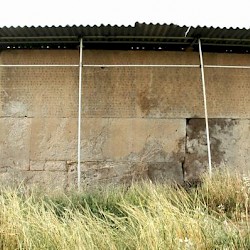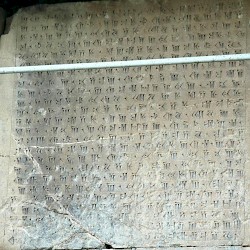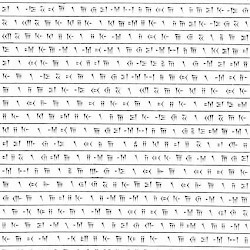DPd
Achaemenid Royal Inscriptions: collection of Old Persian cuneiform texts from the sixth, fifth, and fourth centuries BCE, left by the Achaemenid kings on their official monuments.
[In the following text, to be found on the terrace walls of Persepolis, Darius asks the gods to protect Persia; in the sequel (DPe), and tells about the size of his empire.]
 Persepolis, Terrace, Southern wall, Inscriptions DPd-e |
 Persepolis, Terrace, Southern wall, Inscription DPd |
 DPd (drawing) |
- Auramazdâ \ vazraka \ hya \ mathišta \ bag
- ânâm \ hauv \ Dârayavaum \ xšâyathi
- yam \ adadâ \ haušaiy \ xšaçam \ frâba
- ra \ vašnâ \ Auramazdâhâ \ Dârayavau
- š \ xšâyathiya \ thâtiy \ Dârayavauš \
- xšâyathiya \ iyam \ dahyâuš \ Pâr
- sa \ tyâm \ manâ \ Auramazdâ \ frâba
- ra \ hyâ \ naibâ \ uvaspâ \ umarti
- yâ \ vašnâ \ Auramazdâhâ \ manac
- â \ Dârayavahauš \ xšâyathiyahy
- â \ hacâ \ aniyanâ \ naiy \ tarsat
- iy \ thâtiy \ Dârayavauš \ xšâya
- thiya \ manâ \ Auramazdâ \ upastâm \
- baratuv \ hadâ \ vithaibiš \ bagai
- biš \ utâ \ imâm \ dahyâum \ Aura
- mazda \ pâtuv \ hacâ \ hainây
- â \ hacâ \ dušiyârâ \ hacâ \ dra
- ugâ \ abiy \ imâm \ dahyâum \ mâ
- \ âjamiyâ \ mâ \ hainâ \ mâ \ duš
- iyâram \ mâ \ drauga \ aita \ adam \
- yânam \ jadiyâmiy \ Auramazd
- âm \ hadâ \ vithaibiš \ bagaibiš \ a
- itamaiy \ yânam \ Auramazdâ \ dadât
- uv \ hadâ vithaibiš \ bagaibiš \
A great god is Ahuramazda, the greatest of the gods, who created king Darius and gave him his kingdom. By the favor of Ahuramazda, Darius is king.
King Darius: This country Persia which Ahuramazda gave to me is a good country, full of good horses, full of good men. By the favor of Ahuramazda and of me, king Darius, this country fears no other country.
King Darius says: May Ahuramazda and the gods of the royal house come to my aid. May Ahuramazda protect this country from invaders, from famine, and from the Lie! May there never be upon this country an army, famine, or the Lie! This I pray as a favor from Ahuramazda and the gods of the royal house. May Ahuramazda and the gods of the royal house do me this favor!
The text of this inscription is continued in DPe. (There are similar inscriptions in Elamite and Babylonian, DPf and DPg.)
Literature
- Pierre Lecoq, Les inscriptions de la Perse achéménide (1997 Paris)